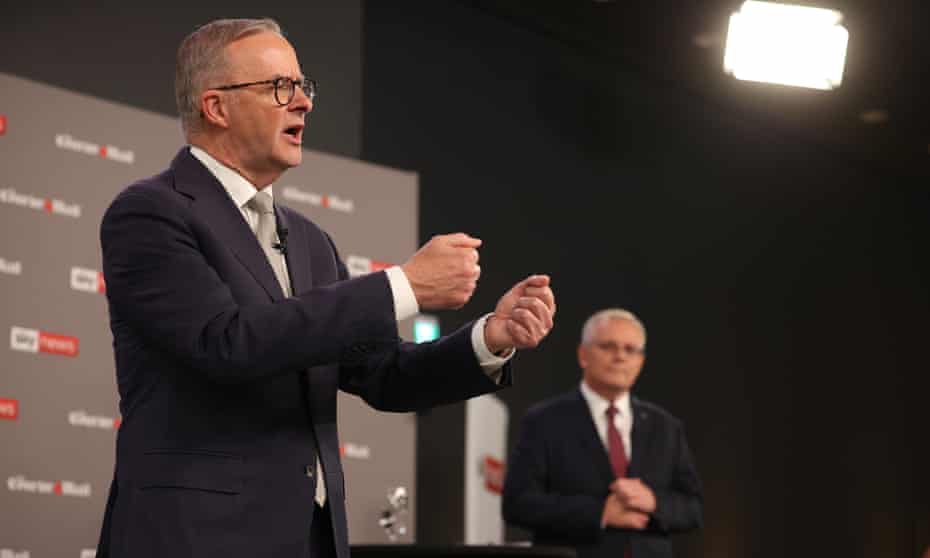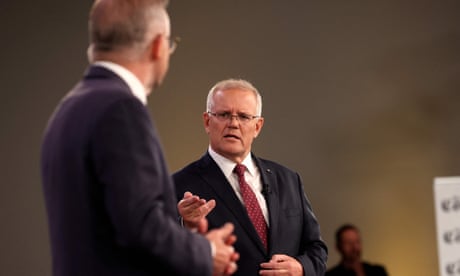Extract from The Guardian
There were stumbles and a few bad moments as audience of swinging voters asked the most substantive questions of the campaign so far

Anthony Albanese, in the first leaders’ debate of the 2022 federal election campaign, moved early to establish professional equivalence with Scott Morrison by deploying a workmanlike grasp of facts and a basic rhetorical flex.
Throughout, Albanese referred to the prime minister as “Scott”. Not the prime minister, or the Liberal party leader, or the more exalted campaign formulation, “my opponent”.
Just “Scott”.
This could have been accidental but it wasn’t. It was status erosion; a deliberate, persistent, quiet, diminution of incumbency, which is the greatest structural advantage prime ministers have in a campaign.
Albanese clearly went into Wednesday night’s encounter with a basic objective: look plausibly prime ministerial. Be familiar on this terrain, without being cloying or presumptuous. Carry yourself as “Scott’s” equal. Be the safe change of your campaign messaging.

Command this platform without looking smug or over bearing, and when “Scott” is too oily, or too sharp, or slightly too rehearsed – when he gets that serene smart arse expression that voters now very easily recognise – provide the required counterpoint. Show as well as tell. Break back into the debate with some active listening and some empathy.
So those were the challenger’s objectives, and he ticked those boxes.
After a bad opening week, the Labor campaign will certainly consider that a win, and the Sky News audience of swinging voters also gave Wednesday night’s encounter to the Labor leader.
For his part “Scott” performed solidly enough, relentlessly on message as always, hungry for total domination as he always is, but careful not to burn too incandescently as he lunged for the last word.
But “Scott” had two bad moments.
The worst was when, attempting empathy, he told a woman with a child with a disability that he and Jenny were “blessed” to have two children without a disability. The woman asking the question had had her son’s package cut under the National Disability Insurance Scheme. Absolute howler.
The second was a very obvious evasion of culpability – a wearisome trait that voters have seen on high rotation over the last three years. Morrison (under fresh pressure because of a decision by the Solomon Islands to sign a security pact with China), felt this (very poor) development (on his watch) wasn’t Australia’s (read, his) fault. This was all China’s fault.
Labor was also in the mix. Morrison wondered why Labor was always taking China’s side. He was back adjacent to the Manchurian candidate nonsense that Canberra’s national security establishment correctly rebuked him about just a few weeks back – a reheat that felt more desperate than considered or smart. Albanese threw down a zinger in response. The government’s policy in our back yard was “not so much a Pacific step-up – it’s a Pacific stuff-up”.
But of more interest was how it was.
The first thing to say is the questions from the audience were sharper and more substantive than most of the questions put to the two leaders over the past week and a half of the campaign.
Voters wanted to know about housing affordability, the nursing workforce, the absent national integrity commission, funding packages under the national disability insurance scheme, the future of renewables and battery technology, the treatment of sole traders left out of jobkeeper during the pandemic, regional security, youth participation and the health of Australia’s democracy.
Not one pop quiz about the unemployment rate (which dominated the first 72 hours of the campaign) or question about the life and times of the unfortunate Katherine Deves (which is continuing to dominate it).
The final question of the night came from Clare. She asked: “The latest polling statistics show that voters have an all time low level of faith in the integrity of both major party politicians. What are you going to do to restore their trust in the democratic process?”
Good question Clare.
Given the seriousness of the times we live in, given Australia has lurched back into disaffection and disengagement and given that lurch is corrosive to the health of democracy, this is absolutely a question that needs answering.
But “Scott” took Clare’s question as an opportunity to unleash his stump speech about economic management.
“Our economic plan is about helping Australians realise their big aspirations in life, have their kids, to raise them, to give them a good education, to buy a home, to save for their retirement, to run a business and to have choices,” he said.
“And that’s why this election is very much about who can run the economy and who can manage money. And following through on those plans, doing what we said we would do, ensuring we said we would get more Australians in their own homes.”
Fixing democracy one house at a time?
Albanese was actually listening to the question. He offered two things – Labor would deliver a federal integrity commission, and if he won on 21 May, he would try to invest in some common ground.
“I want to unite the country,” Albanese said. “I want to not be a prime minister who’s always looking for the wedge, always looking for the division, because if we’re going to move forward as a country, we need to work out our common interests.”
Albanese said his objective would be to unite “instead of the constant argy-bargy which does seem to dominate a lot of our politics and I think you’re right, it’s putting people off.”
Not perfect, that antidote, by any means.
But a start.

No comments:
Post a Comment